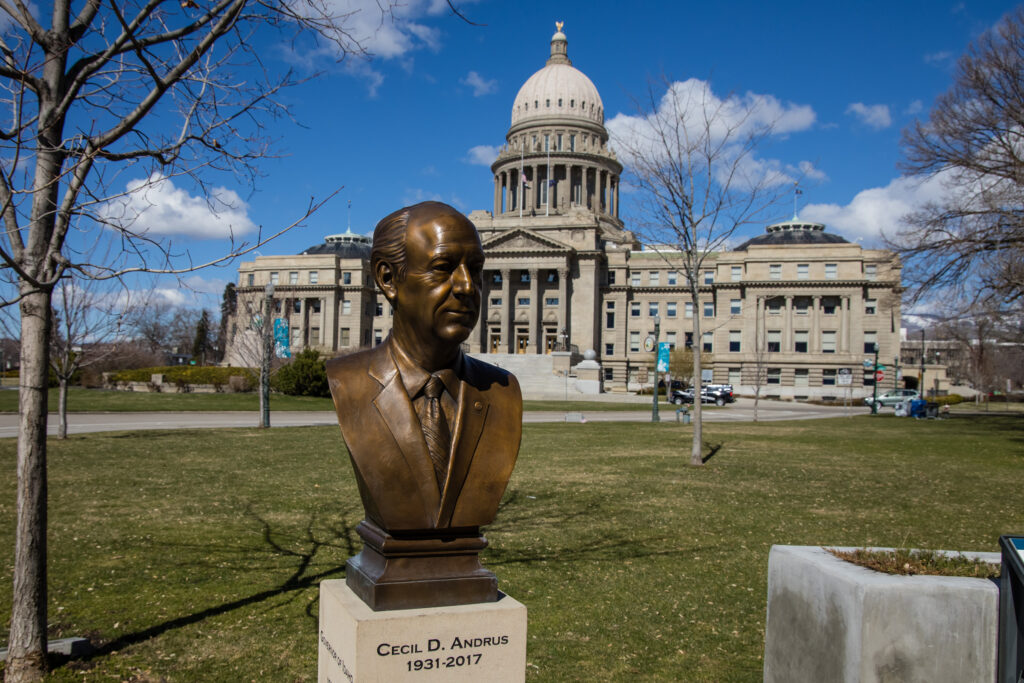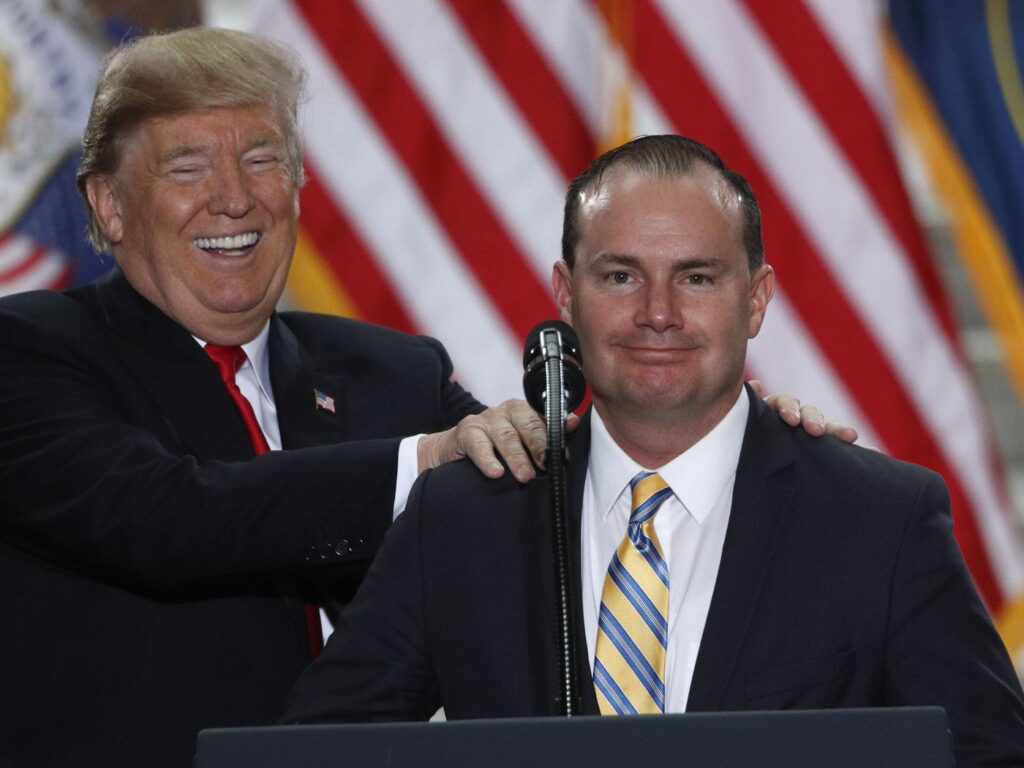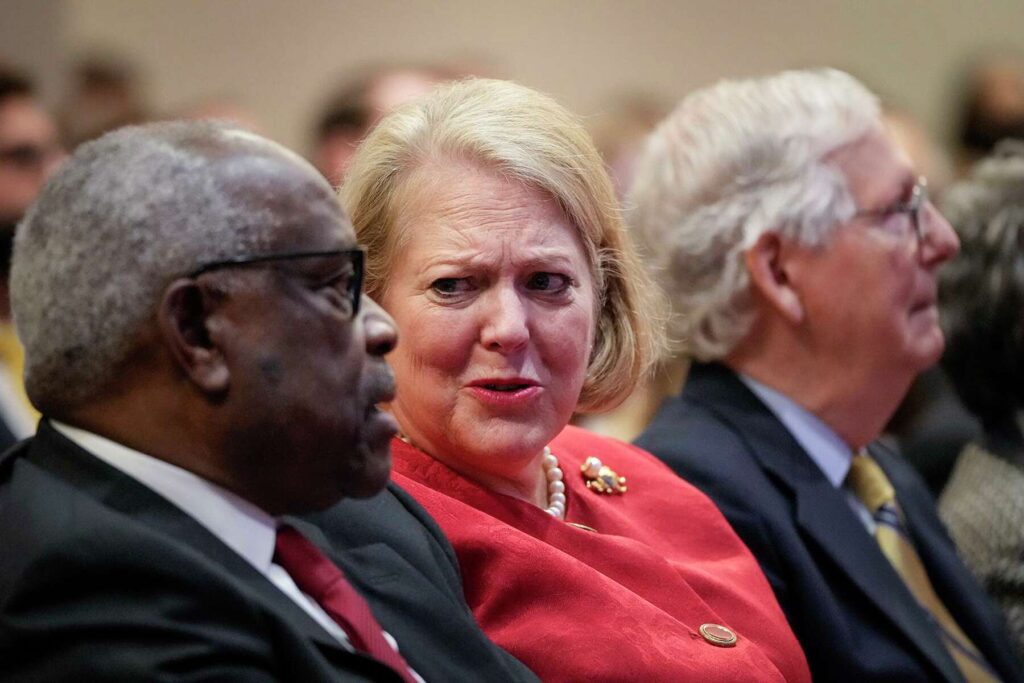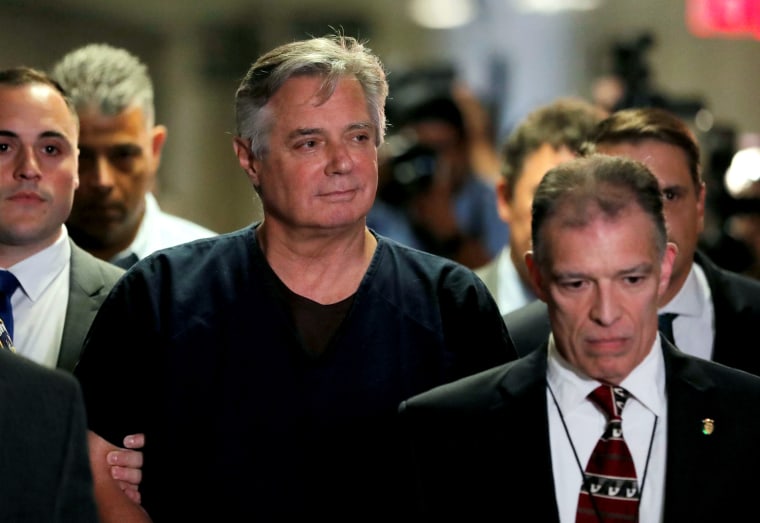Note: Adam Serwer, writing in The Atlantic, reminded us – again – this week that Republican senators had a chance in February 2021 to convict Donald Trump and guarantee that he would never again hold public office.
Most Senate Republicans twisted themselves into political pretzels to avoid hold Trump accountable for the Capitol attack on January 6, even though no one attempted to defend his actions.
As Serwer wrote: “Although seven Republican senators broke ranks and voted to convict Trump, most of the caucus remained loyal to a man who attempted to bring down the republic, because in the end, they would have been content to rule over the ruins.”
Which brings us to very Republican Idaho …
Idaho congressman Russ Fulcher was one of 147 Republicans who voted against certifying the 2020 presidential election for the winner, Joe Biden.
Idaho congressman Mike Simpson has called the House committee investigation into the January 6 attack on the U.S. Capitol “a witch hunt.” Simpson’s dismissal of the investigation as a purely partisan exercise ignores the fact that a string of Republican witnesses – the former attorney general, several Trump White House staffers, the Georgia secretary of state and the Arizona speaker of the house – have provided unrefuted testimony under oath. Some witch hunt.

Idaho senator Mike Crapo, while accepting the endorsement of the former president of the United States has had almost nothing to say about that president’s increasingly well-documented efforts to overturn the election and prevent Congress from carrying out its constitutional duty to count electoral votes.
Idaho senator James Risch, like Crapo, opposed creation of an independent panel to investigate the Capitol insurrection and what caused it. Risch remains mum as more testimony implicates the former president in what a federal judge has called “a coup in search of a legal theory.”
Idaho attorney general candidate Raul Labrador, we know from text messages assembled by the congressional committee, implored then White House chief of staff Mark Meadows on January 6, as Labrador put it, to “get Trump to say something to calm down the people.” Labrador, who supported a bogus legal strategy aimed at overturning state elections, also said to Meadows: “I believed in Trump and I would probably object to the certification today.”
This is the top leadership of the Idaho Republican Party systematically ignoring a Constitutional and political crisis that makes Watergate look like a family picnic. And all in the name of party solidarity.
The Idaho Republican party once included the principled leadership of conservatives like Phil Batt, Jim McClure, Jim Jones and Dirk Kempthorne. The party’s elected leaders today seem as far from principled as Bonners Ferry is from Malad. To steal a line from the late columnist and commentator Mark Shields, these Idaho politicians make Tonto, the Lone Ranger’s loyal sidekick, “look like an independent spirit.”
In commentary in Idaho newspapers recently, former newspaper reporter and one-time GOP publicist Chuck Malloy suggests he knows what Fulcher, Simpson, Crapo and Risch are up to – I include Labrador, as well – with their not so artful dodge of the political issue of our time. The Idaho Republicans are, Malloy wrote, “political survivors,” and “political survivors” know “better than to cross” Donald Trump.

“Political survivors” don’t “buck leadership” because survivors – guys like Crapo in Malloy’s telling – get ahead by making a “political career of being a loyal soldier for Republicans.”
I’m certain my old friend Chuck wrote that to explain – and excuse perhaps – the motivations behind a lack of character on the part of these political leaders. Perhaps inadvertently Chuck also hints at an even bigger truism. Idaho Republican leaders are scared – scared of Trump, scared of the most radical elements in their own party, scared of losing office and power, scared of the mob coming for them. They’re like Mafia capos, the middlemen in the crime syndicate, who aren’t directly in charge of the wrongdoing, but know about it and condone, afraid to cross the Big Boss.
“Republican lawmakers fear that confronting Trump, or even saying in public how they actually feel about him, amounts to signing their political death warrant,” Jonathan Martin, journalist and author of This Will Not Pass said recently. “For most of them, it’s not more complicated than that.”
Survival at all cost no matter the price.
Rusty Bowers, the very conservative Republican speaker of the Arizona House of Representatives, who testified recently before the January 6 committee, is a living, breathing example of the chaos and danger that has been unleashed by the Trumpian Big Lie about the election. After telling the committee that he told Trump lawyer Rudy Giuliani that he would not violate his oath to defend the law and the Constitution to further the former president’s lies about the election, Bower related what happened to him and his family.
Pro-Trump supporters used bullhorns as they protested outside Bower’s Mesa home. Protesters filmed Bower’s house and at least one man showed up with a gun and threatened a neighbor. A recall effort was mounted against the devout Mormon and BYU grad. He was accused of corruption and pedophilia. His friends attacked him. Trump lied about him.
All this happened, while Bower’s daughter lay dying inside his home under siege. All this happened because a conservative Republican told the truth about Donald Trump and pushed back on the stolen election lies. Election workers in Georgia and elsewhere have similarly been threatened and intimidated.
It may well be that Idaho’s Republican leaders are merely pragmatically invested in continuing to be, as Chuck says, “political survivors,” toeing the line and tending to tribal loyalties, but what if they won’t tell the truth because they are merely political cowards rather than survivors? Considering the threats and intimidation raining down on who have dared to tell the truth – Rusty Bowers and this week former Trump aide Cassidy Hutchinson among them – who can really blame these small, timid and quiet men from Idaho?
Yet, like Bowers, like the Georgia secretary of state, like young Ms. Hutchinson, like the Capitol Police officers who fought – and some died – to protect Fulcher, Simpson, Crapo and Risch on January 6, these Idaho Republicans also took an oath to “preserve and protect” the Constitution of the United States.
That oath, as we heard from Speaker Bowers, is a solemn, honorable commitment. It doesn’t apply only when things are easy or convenient. There is no escape clause. You can’t suspend it when the politics get ugly, when Trump demands it, when the mob comes calling, or when too many of your constituents embrace nonsensical conspiracy theories. There is simply no oath that offers an “opt out” for “political survivors.”
Malloy suggests Idaho Republicans believe political courage is for losers. And they may be right. If that be so then we are all losers, and our democracy is the biggest loser of all.
—–0—–
Additional Reading:
A few other carefully curated items for your consideration …
Punchbowl and power in Washington, DC
I’m admittedly pretty “old school.” My sense of journalism in rooted in the memory of Walter Cronkite, David Broder and Ben Bradley. Oh, I look at all the “new” stuff out there – the newsletters, Substack posts, and even Punchbowl, a strange name for a news organization, but OK …
If you care. He’s a dive into what is driving political news out of Washington, D.C. these days.
From the Columbia Journalism Review.
Mystery of Waterloo’s dead soldiers to be re-examined by academics

“Writing in the Journal of Conflict Archaeology, Prof Tony Pollard, director of the centre for battlefield archaeology at the University of Glasgow, has collated vivid descriptions and images from those who visited Waterloo in the aftermath of the 1815 battle, which pitted Napoleon’s forces against a British-led coalition and a Prussian-led one.”
The image is, well, a bit grisly. From The Guardian.
The Early Life of the Renowned Leader of the Lakotas, Sitting Bull
Growing up in South Dakota I’ve always been fascinated by the great Sitting Bull. There is a new book.
“There was no such thing as emptiness in the world,” one Lakota remembered from his childhood. “Even in the sky there were no vacant places. Everywhere there was life.”
Liz Cheney at Reagan Library
Another tumultuous week in American politics and history. I’ll leave you with encouragement to listen to Liz Cheney’s speech this week at the Reagan Library.
“Republicans cannot both be loyal to Donald Trump and loyal to the Constitution,” Cheney said.
Here’s a link to C-Span’s coverage.
Thanks, as always, for following along. Stay in touch. And stay informed. These are perilous times.

































